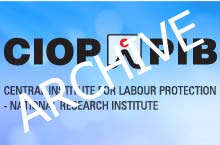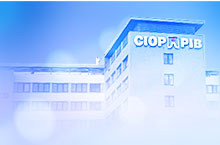Global information resources popularized in the library of CIOP-PIB
Agnieszka Młodzka-Stybel
Occupational burnout - a factor lowering the level of occupational safety
Katarzyna Grunt-Mejer
Burnout is a major psychological predictor of increased risk of accidents at work. People who experience symptoms of burnout are less motivated to take care of their safety and to educate themselves in this field. Burnout is accompanied by fatigue and psychosomatic symptoms, which decrease physical and mental capacity and increase the risk of an accident. That is why it is important for employers and employees to understand this phenomenon and to prevent it.
Professional wireless communication and related electromagnetic hazards
Wiesław Leszko, Patryk Zradziński
Workers who need permanent contact with the commander or dispatcher use various professional devices for wireless communication; their parameters significantly differ from public mobile phone systems. This article discusses parameters of such systems and research results on possible health hazards related to exposure to electromagnetic fields produced by wireless devices. It is necessary to look for prevention solutions that would reduce workers’ exposure in accordance with recommendations of the World Health Organization.
Virtual and augmented reality contemporary techniques in training workers
Andrzej Grabowski
On one hand, the training should be conducted under the most like real conditions, even in the case of dangerous work, so that the employee can obtain a high level of competence. On the other hand training should not to expose people to danger and possible costs associated with damage to property. These seemingly contradictory requirements meet the realistic computer simulations and virtual reality. The article presents possibility to use to train employees immersion virtual reality, simulators, augmented reality and natural interface systems.
Phase change materials in technical-usable and ergonomic applications
Magdalena Zwolińska, Anna Bogdan
The basic information about phase change materials (PCM) and also briefly about the possibility of their applications in various fields of science and practice: in construction, transport, agro-food industry, automotive, chemical or medicine, are presented into this article. In particular, the focus was on discussing about the possibility of using PCM in order to reduce the thermal load through using phase change materials in textiles and cooling vests.
Technical reasons to accidents in individual agriculture in 2010
Anna Groborz
The article describes the characteristics of accidents in agriculture for technical reasons, which have occurred in the Polish individual farms in 2010. The analysis includes all accidents reported to the Agricultural Social Insurance Fund (KRUS), which the proceeding of evidence has been completed by the end of 2010. There was given recommendations to farmers, to be followed when working with technical items, such as the machinery, equipment and agricultural tools. These recommendations will be useful for engineers and safety specialists, inspectors for accident prevention or the teachers and students of agricultural schools.
Jolanta Skowroń
|









